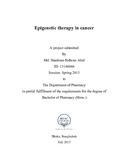Epigenetic therapy in cancer

View/Open
Date
2017-07Publisher
Brac UniversityAuthor
Abid, Md. Shadman RidwanMetadata
Show full item recordAbstract
Epigenetic therapy has received much attention in the field of oncology in recent years. A growing recognition of the influence of epigenetic modifications in tumorigenesis and the clinical success of several drugs that reverse the aberrant epigenetic alterations have positioned epigenetic therapy at the forefront of anti-cancer drug development. Several epigenetic enzymes such as DNA methyltransferase, histone deacetylase, topoisomerase,and EZH2 have been successfully targeted by small molecule inhibitors. Potential epigenetic modifiers are continuously being optimized for bioavailability, half-life, metabolism, and most importantly target specificity. Discovery of new compounds has also broadened the pipeline of latest epi-drugs. Considering the prospect of success of epigenetic therapy against lethal malignancies, in this review we aspire to describe how different abnormal epigenetic patterns such as excessive DNA methylation, histone deacetylation, and defective chromatin remodeling contribute to cancer and present an overview of the current implementation of epi-drugs along with combined therapy in cancer treatment.
